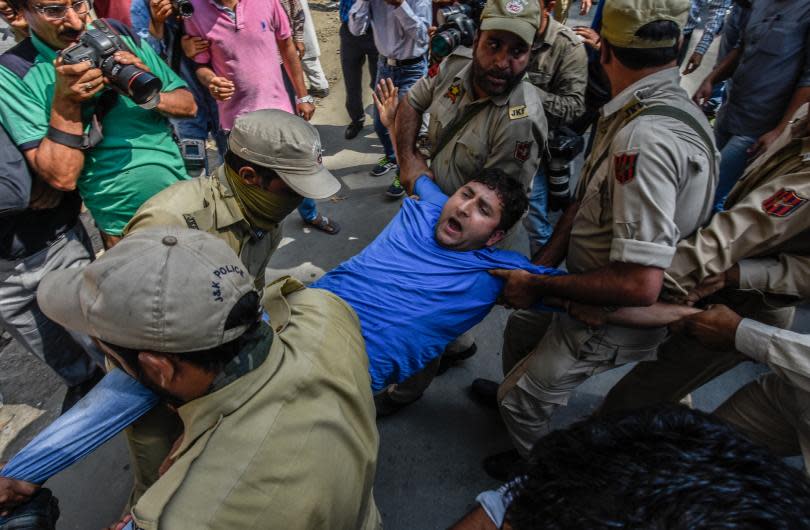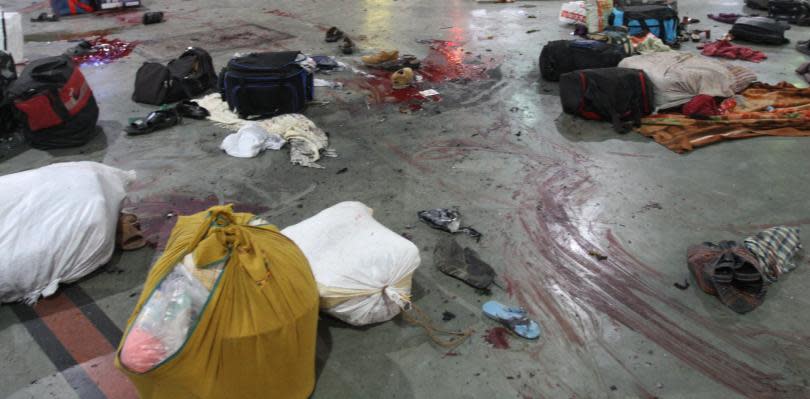India, Pakistan Continue Long-Running Conflict
A rising of tensions between India and Pakistan in recent days has led to fears the two neighboring nuclear powers could be heading down a dangerous path to further conflict. Militants who India claims had links to Pakistan attacked an army base in the Indian-controlled region of contested Kashmir last week, killing at least 17 in the deadliest attack on security forces in the area in almost two decades. India retaliated Thursday, carrying out “surgical strikes” on Pakistani-administered Kashmir, claiming to have caused “significant casualties to terrorists.”
While Pakistan downplayed the attacks, the war of words and, more perhaps worryingly, actions continue over the Himalayan region that has been at the heart of three wars between the two countries over the past 69 years.
Below is a timeline of the events that preceded the latest conflict between the two countries:

Indian government forces detain a supporter of, Engineer Abdul Rashid of Awami Ithaad Party, a pro-Indian political party, during a protest march towards the United Nations Military Observer Group in India and Pakistan to protest against the recent killings of civilians by Indian government forces, Sept. 26, 2016. Photo: Getty Images
1947-1948 – India’s independence from Great Britain after World War II saw the ruler of the princely state of Kashmir, comprised of a majority Muslim population, tasked with deciding which of the newly created independent states to join – India or Pakistan. An attack by Muslim tribesmen in October 1947 prompted Maharaja Hari Singh to seek assistance from India and later to sign an Instrument of Accession, ceding Kashmir to India.
That led to the start of the first war over the region, which was only halted Jan. 1, 1949, when a United Nations-brokered ceasefire created a line of division that gave India control of 65 percent of the territory and the remainder to Pakistan. Intended to only be a temporary arrangement until a referendum was held, the division remains in place to this day.
1957 – India declared Kashmir an integral part of the Indian Union.
1965 – An April clash between border controls in Kashmir precipitated a covert operation by Pakistan into India-controlled territory. India followed by invading Pakistan along the country's Lahore border, leading to the second Indo-Pakistani war. After three weeks of warfare, the two countries agreed to a UN-sponsored ceasefire and signed a declaration the following January to settle their disputes by peaceful means.
1971 – India and Pakistan went to war for a third time, but it was the first time the conflict did not involve Kashmir. In that instance, a civil war between the West Pakistan army and East Pakistanis demanding independence sparked conflict. After the Pakistan army tried to halt the uprising, India intervened with an assault against East Pakistan. More than 90,000 members of the Pakistani army became prisoners of war after the end of the 13-day conflict which led to East Pakistan becoming the independent country of Bangladesh Dec. 6, 1971. The following year, India and Pakistan signed the Simla Agreement, exchanging the withdrawal of troops for the release of prisoners of war and attempting to set a blueprint for future peaceful relations.
1989 – Armed resistance to Indian rule in the Kashmir valley commenced as Muslim political parties, claiming state elections in 1987 were rigged, formed militant wings. Pakistan offered the insurgency its “moral and diplomatic” support, while India claimed Pakistan was providing weapons and training. New militant groups would continue to emerge throughout the 1990s.
1999 – Shortly after both countries conducted nuclear tests, then-Indian Prime Minister Atal Bihari Vajpayee and his Pakistani counterpart Nawaz Sharif signed the Lahore Declaration, reaffirming the Simla Agreement. However, just a few months later the two now nuclear powers would be engaged in conflict once again. The Kargil War started when India launched air strikes against Pakistan-backed forces which had crossed over to the Indian side of the Kashmir border. Tens of thousands of civilians on both sides of the border became refugees before Sharif ordered the withdrawal of the infiltrating forces.
2001 – An attack on the Indian Kashmiri assembly in Srinagar, which killed 38, was followed by an armed attack on the Indian parliament in New Delhi, killing 14 more. India continued to condemn Pakistan for cross-border terrorism before Pakistan President Perez Musharaf promised to counter extremism on the country's own soil.
2007 – The day before talks were due between the two governments, a train operating between India and Pakistan was bombed, killing 68 people, mostly Pakistanis. Both countries’ governments condemned the attack but nobody was convicted for it.

People belongings are seen at the shooting site at Chattrapati Shivaji Railway terminus in Mumbai on Nov.26, 2008. Nearly 80 people were killed in a series of shootings and blasts across India's financial capital Mumbai late 26 November, the state government said. The Maharashtra state government said the death toll had risen to 78, according to the Press Trust of India news agency, and that six Indian army units had been deployed to the south of the city. Heavily armed men with automatic weapons and grenades targeted two of Mumbai's top luxury hotels, the Taj Mahal and Trident, and the main Chhatrapati Shivaji railway station Photo: Getty Images
2008 – Armed gunmen opened fire on civilians across the Indian city of Mumbai Nov. 26. More than 160 people were killed. Though Pakistan denied involvement or knowledge of the attack, India broke off peace talks.
2010 – Protests by Muslims in Indian-controlled Kashmir led to a crackdown by Indian forces, leaving 120 people, mostly youths, dead.
2016 – A calming of relations in Kashmir was fractured after a July killing of a 22-year-old separatist militant named Burhan Muzaffar Wani by Indian security forces.
Related Articles


